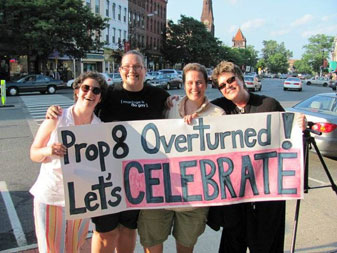Gently Read Literature is a monthly web journal of essays on contemporary poetry and literary fiction. In “The Myth of Women’s Masochism”, her essay in the September issue, Stephanie Cleveland takes aim at the eroticizing of violence by successful female poets. Her argument echoes the radical feminist critique of so-called Third Wave feminism, namely that young women today have bought into the rebranding of sexual exploitation as avant-garde and liberating, because it seems too hard to fight the patriarchy. See, for example, Ariel Levy’s Female Chauvinist Pigs: Women and the Rise of Raunch Culture (Free Press, 2005).
Cleveland’s article begins thus (boldface emphasis mine):
A few years ago, I read an essay in Boston Review on sex education in the U.S. public school system. In that essay, poet and Harvard lecturer Maureen N. McLane praised self-proclaimed “sex-radical” Pat (now Patrick) Califa as a sexual revolutionary. McLane identified Califa’s “infernal trinity—family, conventional sexuality, and gender,” as the fundamental institutions “sexual conservatives wish to defend” (30). She then assured her readers that, although, “From one angle, Califa’s work [] feature[s] defenses of man-boy love, [her] sex-positive embrace of critical sexual thinking, wherever it might lead, remains, if not a model an incitement” (30). My question at the time of reading McLane’s essay remains my question for those who identify as sex radical while simultaneously claiming an allegiance to feminism to date—namely, what exactly is a defense of “man boy love” an incitement to? Put another way, if feminism involves a commitment to social justice, equality, and respect of persons, and if it also involves a commitment to the emancipation of women and children grounded in a rejection of sexual abuse and patriarchal sex (Bar On 76), how then could any incitement toward acceptance of child rape be consistent with a feminist approach to sex?
Far from radical, I would argue that the practice of sexualizing the bodies of children for adult men is actually fairly conventional, as old as patriarchy. Feminism, conversely, affirms the radical (and comparatively new) idea that all practices which violate the rights of women and girls to determine what can be done to our bodies are morally and ethically unacceptable (Bar On 76).
I bring up McLane’s essay here because I think it highlights the ways in which, in recent decades, feminism has been co-opted by a school of neoliberal individualism which aims at preserving—or at least making peace with—the sexual status quo. When pondered thoughtfully however, the fact of child sex abuse throws a pretty big wrench into the liberal argument that the right to individual expression in one’s sexual conduct needs to be upheld at all costs, as does the fact of rape. Our sexual relationships take place within a given social context, one under which all people do not have the same access to power. In order to deny a rapist the ability to “express” his sexuality on or in her body, a woman needs political, social, and economic equality with men; we currently have none of these. This means that a refusal to make judgments about sexual choices and sexual ethics, whether consciously intended or no, is a tacit endorsement of male-supremacy and a boon to those with the most power in contemporary culture—that is, white men.
Perhaps more importantly, abdicating the right to make ethical judgments about sex translates to an abandonment of the vulnerable and comparatively weaker; it is an extremely effective way of silencing victims of child rape. Critical sexual thinking on the other hand involves maintaining an awareness of the material context within which our relationships take place. It means choosing which versions of sex fit with the world we would like to create as feminists. This cannot be reduced down to simply following wherever sexual thoughts might lead—particularly not if they lead to acts of violation on or in another person’s body. That sort of following has more to do with cruelty, privileged laziness and irresponsibility than it does with revolution.
Sadly, I write at a time when postmodern ethical relativism has all but silenced critical thinking about sex in the academy. Many women working within the university system seem reluctant to challenge male-supremist ideology on sex directly; at a time when the predominant philosophical mode holds that nothing really means anything apart from the way we choose to interpret it, overt questioning of social inequity and misogyny do not win a female author any popularity points. But, if as Erik Anderson optimistically writes, “postmodernism as a loose set of aesthetic principles (or loosely principled aesthetic, or principally loose aesthetic) [may have already] ended or is ending” (1), I would argue that women’s poetry ought to be used as a weapon to help hasten that decline.
Instead of defiance however, in my reading of contemporary women’s poems I frequently find male dominance eroticized, masculinity deified, and the sexual subordination of women and children embraced or symbolically “played with,” but seldom challenged. The conventional notion of women’s supposedly innate sexual submissiveness seems to have saturated much contemporary poetic work as well, especially among women. We write as though we are afraid of creating anything that might dampen the erection of a male colleague. Men after all—even the sensitive, literary ones—have frequently laughed at our gentler, more egalitarian versions of sex; they’ve explained to us repeatedly that making love is dishonest, while fucking is truth. And we believe this, groomed to doubt ourselves, determined to prove we can succeed in the male dominated upper echelons of the poetry community….
Read the whole article here.
